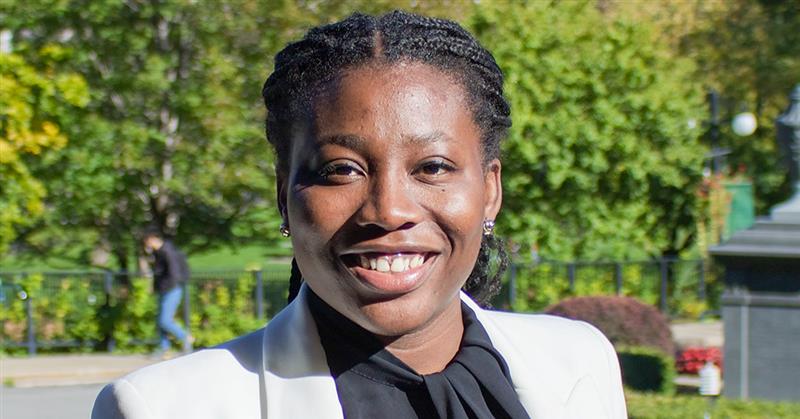
This Q&A series is part of Black History Month and Beyond, an initiative of the Black History Month (BHM) Organizing Committee co-led by Black students and faculty from the Faculty of Medicine and Health Sciences with the Equity, Diversity, and Inclusion Anti-Racism Committee (EDI-AR) of the School of Population and Global Health.
Can you tell us a bit about yourself?
My name, Divine-Favour Chichenim, reflects my Nigerian roots, and is often a quick giveaway of where I am from. I was born and raised in Nigeria and moved to Montreal, Canada, in my early twenties to further my education. I am a public health professional and program coordinator, with a huge enthusiasm for process improvement. I am currently in the fourth year of my doctoral studies in Epidemiology. Outside of my academic and professional life, you will easily catch me watching food shows or collecting and caring for plants.
Can you describe your program of study and your research project?
Under my program of study, Epidemiology, I align most closely with the field of social epidemiology, as my interests lie in understanding how social factors shape healthcare use, processes and outcomes. I have a particular interest in immigrant health promotion, and this is the focus of my thesis. I am investigating the disparities in diabetes care and healthcare utilization patterns between immigrants and non-immigrants recently diagnosed with diabetes in Canada. Through this research – conducted under the supervision of Professor Amélie Quesnel-Vallée and supported by the prestigious Fonds de recherche du Québec – I aim to understand the trajectories of healthcare use before and after diabetes diagnosis, how these patterns may differ across immigrant groups, and their contributions to health outcomes within these populations.
What inspired you to pursue your area of research? What do you hope to achieve?
From a young age, when I first encountered refugees in Nigeria, I became deeply curious about the experiences of immigrants, both those who migrate voluntarily and those who face forced displacement. I often pondered what it means to adapt to a new and unfamiliar environment, how individuals in such situations navigate unfamiliar systems – especially healthcare, given my long-standing interest in the medical field – and how they reconcile their old and new cultures. Since moving to Canada and becoming an immigrant myself, these questions have become even more personally pressing. Thus, through my research, I hope to find answers to some of these questions and advocate for improved healthcare provision that considers both the pre-migration and current social conditions for immigrants.
Why did you choose McGill?
McGill University is renowned for its strong public health and research programs, so when the time came to decide among the admission offers I received, choosing McGill was a straightforward choice. Although moving to Montreal was not without its challenges, it was an opportunity I embraced as it pushed me to learn independence in an environment vastly different from home. Living here has also given me the chance to learn a new language and expand my skill set in numerous ways.
Can you describe your community involvement and why you feel it is important, especially as a member of the Black community?
In Nigeria, I volunteered for various causes, including HIV and malaria awareness campaigns and supporting street children. These issues are critical in Nigeria due to the high prevalence of these diseases and the growing number of street children. Working on these causes was both humbling and rewarding, especially seeing the impact of our efforts.
In Canada, while I no longer engage in the same direct work, I worked as a grants coordinator for the McGill Global Child Health Program, where we provided mini-research grants to researchers in resource-limited communities, most of which are based in Africa. The awardees are typically grassroots researchers, so knowing that by supporting them I am directly impacting and improving the health of communities is incredibly fulfilling.
I also support fellow Black and international students by guiding them to available resources, to the best of my knowledge. Additionally, I have organized social events for Black international students in my department to foster a sense of community away from home and help them adjust to their new environment. Currently, I am focused on becoming more involved in Black-focused groups, such as the SPGH Black History Month committee.
Being involved in these initiatives is important to me because it allows me to contribute to the well-being and empowerment of the Black community, both locally and globally.
How has your identity as a member of the Black community formed your research interests or community involvement?
Throughout my academic journey and in exploring my research interests, I have come to understand the various factors that put Black people at higher risk for health conditions, particularly diabetes. These factors include genetic predispositions, as well as the impact of our intersecting social identities and statuses. For Black immigrants, who represent the second-largest racialized immigrant group in Canada, these risks are even more pronounced. As a Black immigrant woman, this knowledge has strengthened my determination to better understand how we can improve health outcomes and life chances for our community.
What advice would you give your younger self, knowing what you know today?
I would echo the advice my mom gave me: “Do your part and do it well; let the other party worry about how to do theirs.” Also, there are valuable lessons to be learned from every opportunity, so always seize them, even if they seem bigger than you. That said, it’s important to always keep your priorities in mind.
